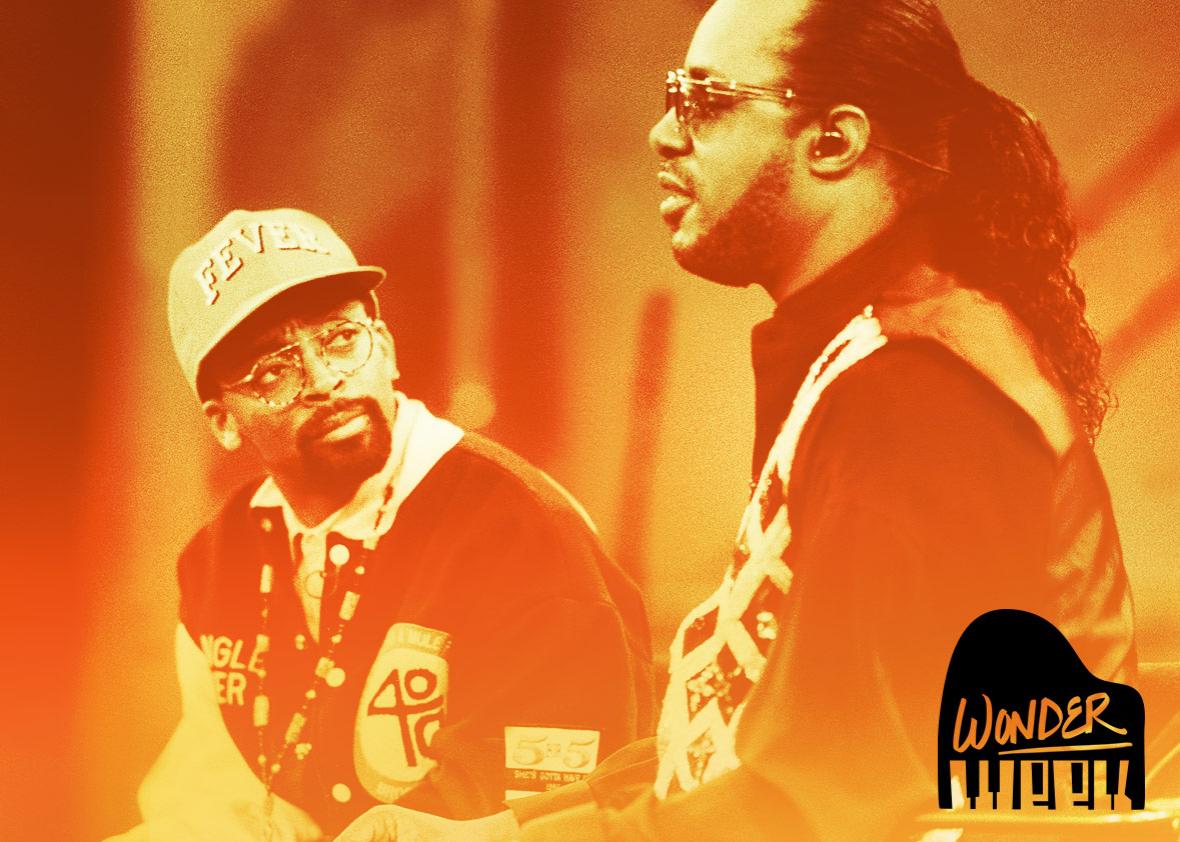Though he did compose original songs for the little-seen 1978 documentary The Secret Life of Plants and then later 1984’s wafer-light rom-com The Woman in Red, few would put Stevie Wonder’s movie soundtrack work on the same level as that of some of his 1970s soul music peers, such as Curtis Mayfield (Superfly, Claudine, Sparkle, Short Eyes), Isaac Hayes (Shaft, Truck Turner, Three Tough Guys), Marvin Gaye (Trouble Man), and Willie Hutch (The Mack, Foxy Brown).
Instead, Stevie’s zenith movie moment didn’t arrive until 1991, when he released his original soundtrack for Jungle Fever, Spike Lee’s trenchant urban reimagining of such Hollywood miscegenation morality films as Guess Who’s Coming to Dinner. Bubbly funk hits (“Gotta Have You,” “Fun Day”) and quasi-cyborgian midtempo anthems (“Chemical Love,” “Each Other’s Throat”) line up next to sentimental power ballads, such as “These Three Words,” and spellbinding jazzy slow jams, such as “Make Sure You’re Sure”—yup, Jungle Fever marked a significant critical comeback for Stevie, whose middling ’80s synth soul-pop exploits diminished his stature. Of the two full-length studio albums he gifted us with in the 1990s, Jungle Fever is the clear standout. I sat down with Lee at his Brooklyn office to get the full story of how Jungle Fever came to be.
“Stevie and I had a relationship before Jungle Fever,” the writer-director explains:
He wrote the song “I Can Only Be Me” for my film School Daze. And one of my favorite songs ever is “Living for the City”—it’s about New York City. I said to myself, “One day, I’m gonna use that song in a movie. And a lot of times I keep shit in my mind, and I say to myself, there’s gonna be a time when I make a movie and the song will reveal itself. So I said I knew I had to use that for Jungle Fever. Now, I’ve used a lot of music in movies, and I’ve chosen a lot of songs for a lot of images. But the imagery of Flipper Purify [played by Wesley Snipes] looking for his brother Gator [played by Samuel L. Jackson] when he goes to the local crack den while “Living for the City” plays on the soundtrack? That was the ultimate 1980s crack den. The Taj Mahal of crack dens! And so I consider “Living for the City” part of the Jungle Fever soundtrack even if it’s not on the album.
Lee continues:
Now, when it came time to make the soundtrack, everybody and their mama told me that Stevie Wonder is notoriously late and there is no way he’s going to deliver the songs on time. I heard this from his label Motown and from Universal Pictures. Still, I was determined. I told Stevie: “I want your next album to be Jungle Fever.” He replied, “I gotta read the script, Spike.” Somehow Stevie got the script. He read it in braille. After that, we would send him scenes and Stevie would write songs custom-crafted for the movie. You have to remember: Stevie goes to the movies all the time. He has someone, an assistant, whisper to him what the imagery is. When you’re blind, sometimes you develop your other senses even more.
I ask Lee about the process of their collaboration:
Oh, Stevie hit it out of the park. He would send in a song and tell me, “Here’s where I think it should go in the film, but if you want to move it around, go ahead.” Every song he wrote for the film ended up in the film. There was no extra material lying around.
The Jungle Fever soundtrack also boasts “Feeding off the Love of the Land,” a sublime Songs in the Key of Life–style ballad that plays over the end credits, in a special version with orchestral overdubs by Lee’s composer father, Bill Lee. But the track isn’t included on the album release because it was originally commissioned for a George Harrison benefit, and Lee couldn’t get it licensed for Jungle Fever’s physical release.
But, as if to counterbalance this end-credits high, Jungle Fever also contains the title track. In my opinion, it’s one of Stevie’s most uninspired songs, right up there with 1982’s ill-conceived treacle-fest duet with Paul McCartney “Ebony and Ivory.” (At least Stevie did not write that one.)
“He’s got jungle fever/ She’s got jungle fever/ We’ve got jungle fever/ We’re in love”: The chorus is a textbook case of unimaginative literalism, and Stevie’s chord progressions are Crayola paint-by-numbers basic—we’re a universe removed from the impressionistic conceptualism we associate with Mayfield’s Superfly or Gaye’s Trouble Man. Sidestepping any of the nuance of the film itself, the title track from Jungle Fever is aggressively shiny, all surface, no reflection. It even became a sort of pre-internet, pre–social media meme; Alfonso Ribeiro’s permanently unwoke Carlton Banks character from The Fresh Prince of Bel-Air got a memorably famous turn at singing it on the show, and on Scrubs, years later, Zach Braff did the same.
“Here’s the thing though about the title track,” Lee says. “Stevie was writing for the movie. The song is just like my style of filming. I just come at you. I’m upfront. There’s been a lot of criticism of that song. But Stevie was serving the material. He was writing the songs in the in-your-face tone of the movie. You saw that scene with Mike [played by Frank Vincent] beating Angie [played by Annabella Sciorra] with the belt in Bensonhurst? It’s in your face!”
I ask Lee what he thinks of the Jungle Fever soundtrack now, 25 years after its release. “It holds up,” the bespectacled director says with his usual, charming terseness. “It holds up.”
